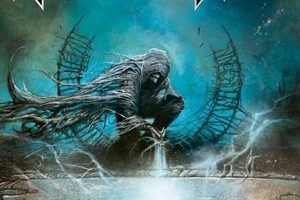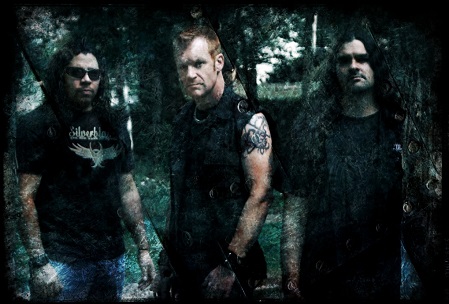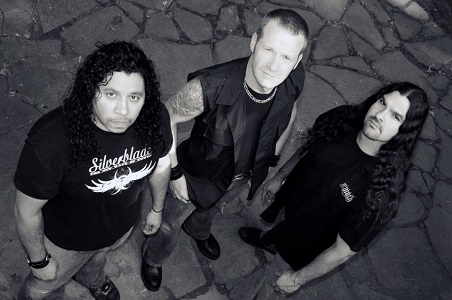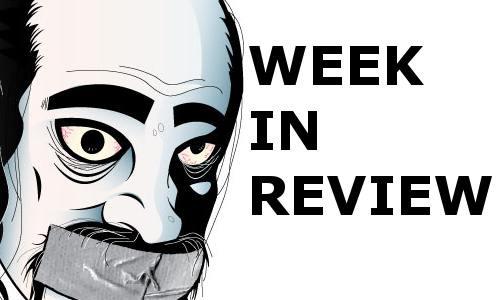Ashes of Ares – Delve Into the Well
Sunday, 25th November 2018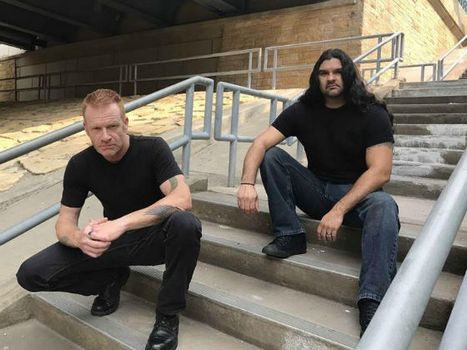
When certain musicians touch us with their music, we usually follow them for life. Even when they leave mainstay acts, you care enough to want to hear what’s next in their creative output. When singer Matt Barlow retired from Iced Earth for the second time, most knew that he would still develop material in the metal scene. Ashes of Ares started in 2012 as guitarist/bassist Freddie Vidales and Matt Barlow formed this musical bond, developing a sound that embraces a mixture of power, progressive, and traditional influences plus some modern/extreme offshoots. Their self-titled debut on Nuclear Blast in 2013 made a solid impression – and now with a new record label deal in place, the follow up Well of Souls hits the streets.
As you’ll discover in this talk with Matt, there have been a few trials and tribulations that took place in the five-year break between records. You’ll learn more about his decisions to start another chapter in his life away from Iced Earth, favorite memories he’s had through the years – as well as where he wants to take Ashes of Ares in terms of the music, output, and live performance angles. We also delve a bit into the lyrical content of the new record, and geek out on some James Bond talk.
Dead Rhetoric: Well of Souls is the latest Ashes of Ares album – five years after your self-titled debut. Were there any specific delays or obstacles that took place between records – or is it just a natural evolution because of work/life/family balance that takes place for the members?
Matt Barlow: It’s some of that- but we certainly had some hiccups in there. I don’t know if you are aware or not, but (drummer) Van (Williams) – his wife was diagnosed with cancer a couple of years ago. It really slowed things down a little bit, and obviously we wanted to make sure that he had the time to take care of his wife. As it would be, he was involved in another band with Ghost Ship Octavius, and those guys are more able to tour and make money than Ashes, so Ashes was put on the backburner. Van bowed out of the band, and Freddie and I still went forward. There was a record label change in the meantime – so a lot of things contributed to (the break).
The one thing I can say is it’s not going to happen again. He and I are the main writing base, we’ve gotten back to that formula and we will continue down that path. So there will not be as much time between this record and the next record, I can guarantee you that. What we’ve gotten so far in terms of feedback for this record has been really positive, and the record label is satisfied so they will push us more. We want to give the fans more of what they want to hear.
Dead Rhetoric: Where do you see the major differences between the two records? And do you believe you and Freddie Vidales are gaining better perspective and understanding with where you want to take the band in terms of the songwriting and performances?
Barlow: I think so. We both have certain elements that we contribute. Freddie is very outspoken about who his influences are- it’s everything from Iron Maiden to Death, and everything in between. I certainly have mine – and we try to make all of those things come together. I think we’ve done a pretty good job. We are solidifying what we think is Ashes of Ares and what we want to do. We don’t want to be trapped necessarily in a box, we want to experiment as much as we can. I am sure there are going to be folks that don’t like every song on this record, and that’s fine. We want to keep an ebb and flow to each record, different songs with different emotions and different feelings. We don’t want everything to sound very much the same across the board. We don’t want two songs to sound so similar that they could be the same song, just changing out some lyrics. We are very conscious of our writing and how we want to write, and make things as different as we can within the genre that are proud to be representing here in metal. We want to push the boundaries as much as we can.
Dead Rhetoric: And where were you coming from lyrically on this record?
Barlow: I came from a couple of different places. Some different topics, and I went back to some topics that are comfortable to me. Maybe some folks who’ve already heard “Soul Searcher”, that’s another one of my odes to vampirism. I try to make things as multi-dimensional as possible – you may listen to that song and hear other things in it that you can relate to on a personal level. I always get a lot of feedback from that – they may think a song is about somebody who’s soul is being shattered and their heart is broken. In a way it could be – or it literally could be me searching to get my soul back.
At the same time, I like the fact that people can interpret things differently, that’s one of the beautiful things about music. That’s the way I approach all songs- if there can be more than one meaning within a song, that’s just a better song. More people can relate to it in different ways. Some of the best songs ever written are delivered that way. You might listen to “Bohemian Rhapsody” one way, and somebody else hears it a completely different way. We have a trilogy also within this record, introducing some concepts in my brain about our connection with Earth and us not being just dwellings on the surface but actually being a part of it. Part of a living, breathing planet- and I really believe that. We should not separate ourselves so much from the Earth and understand that we do have this connection, we rely on Earth just as much as the Earth relies on us. Not just on a carbon footprint type of level, but also a spiritual level. I think we need to recognize that.
A science-fiction thing, with some spirituality and religion mixed in there a little bit. These are concepts that I touch on a lot within songs a lot, they fascinate me, and I hope they touch other people and get conversations going. We have a song on the record “The God of War”, the ode to our namesake of the band. It gives a persona to the character, and brings in all the concepts of war – how he feeds off our fear and our anger. A lot of different concepts, and that’s one of the great things about being able to write lyrics, I get to explore a lot of different space.
Dead Rhetoric: You recorded “You Know My Name” as a tribute to Chris Cornell, beyond being a James Bond movie franchise follower. What intrigues you most regarding Chris’ voice and delivery – and what specific Bond movies resonate the most for you?
Barlow: The interesting thing about that, it was a smart song choice for the movie. Casino Royale is a great introduction to Daniel Craig’s Bond – another breath of fresh air for that franchise. It helped modernize James Bond while also paying tribute to the classic Bond by taking that story on. They had done another Casino Royale with sort of a comedy, Peter Sellers twist- but to me it just wasn’t right. I still believe this song is the best James Bond theme – and I will put it up against “Live and Let Die”, or any of the other ones.
Chris Cornell has always been one of those voices that to me is just phenomenal. He is another one of those guys that may not have had the best technical voice, but the timbre of his voice and the way he delivers the lyrics is special. “Black Hole Sun”, any number of songs we could have done – but this song resonated with me and Freddie and I are huge James Bond fans. With Chris passing and so many other artists passing within the past several years – it was an ode to other people, Warrel Dane as well. It’s unbelievable how many folks we are losing. I didn’t know Chris at all personally, but his passing really hit me emotionally and my wife even questioned me about it. He was a few years older than me, it hit close to home. Warrel passed after that, and a lot of things happened at once. We were very happy to do this as a tribute to all the heroes that are passing.
All the Bond movies are phenomenal. James Bond is a character that is cool for me. I look forward to the next movie, even after Craig gives up the mantle. I remember watching these movies as a kid, with my dad and my brothers. I started with Roger Moore in the 1970’s, and going back to look at Sean Connery. It was ahead of its time, the movie magic. I was fascinated with all the gadgets. He was the first real superhero on the big screen to me, back in the day. The stories are always really solid.
Dead Rhetoric: What would you consider some of the pinnacle moments in your career – either when it comes to the studio for songs/albums, or on the live performance front?
Barlow: Pinnacle, I go back to the Live in Athens performance with Iced Earth. It translated into a really huge, live record for us. That was huge – doing all those shows, the fans were such a part of the record. I’ve been really blessed to have a lot of great shows, a lot of great fans, and a lot of great tours. With Ashes, we’ve played at ProgPower, the Rock Hard festival, great crowd responses at both of those shows, and we look forward to many more (shows). Hopefully with this record we will be able to get over to Europe and promote the record, and do some cool shows.
Dead Rhetoric: Being a part of the music industry for so long, how do you view things today in comparison to your time of the 1990’s and 2000’s when Iced Earth was at a peak in many territories as far as sales and popularity?
Barlow: I don’t exactly know. The industry has changed dramatically. Back in those days, the band wasn’t touring as much – maybe not to our benefit. Maybe we should have been touring more. Records would sell the band, and Jon would make money with selling records. I was making more money through writing royalties, which has definitely gone down. The Iced Earth back catalog does sell, but the royalties have gone down dramatically, because of people stealing music. People don’t buy as much physical music, and people aren’t buying whole records anymore, they download one or two songs here and there. When all you were selling was physical stuff back in the day, an artist would get paid, and that (allowed) artists to be able to make some money. The record deals were better, they knew they could sell x amount of records and they could pay the artist x amount of dollars per mechanical record sold. Maybe in some ways the artist ended up resting on their laurels a bit. It was less of a risk to go on tour – but now it’s the way that artists are making money.
One of the reasons why I left Iced Earth for the second time was Jon needed to make sure that the band could tour more, and to keep the band alive. Touring is life now for bands. It makes total sense to have bowed out for me because I wasn’t going to be away from my family and tour six – nine months out of the year. I do see trends changing more – we are blessed within the metal community because I think they buy more music. It’s hard for musicians to make a living if they are not making money.
Dead Rhetoric: Did you feel like you ended up going through an adjustment period when you went from Iced Earth to being off the road working as a police officer? What do you think was hard for the general public to understand regarding your decision to leave the band for good?
Barlow: The misconception is that musicians make money being musicians. I was making some money, but I wasn’t making enough to live. I couldn’t support my family with the things I wanted to be able to do, and this was at the age of 33 years old I saw the writing on the wall. If I didn’t make an adjustment, it really could have been too late. I wanted to be able to retire when I got older – you start thinking about that stuff. There was an adjustment, and it was the right adjustment for me. There was an adjustment for the fans to understand, but there was an overwhelming support for people who got it. People who are around that age or higher, they understood the change because they too have to make those same kinds of choices in their lives, steady employment with retirement in mind. Some people will never get it, they look at me touring the world with this great band, and yeah I get that. At the same time, but like anything else, if you are busting your butt and not making enough money at it, you can only live off that thrill of the moment on stage for so long. You still have to pay your bills like everyone else. You have to have a place where you can hang your hat, and the only way to do that is to be able to work and do it.
Iced Earth is not necessarily still at that level that all those guys are able to make their living off of that solely. Brent teaches drum classes when he’s not out touring. I know I made the right decision, and I’m really happy that Iced Earth is still going and they are out there kicking butt. I’m 15 years into my career, and that’s hard to believe. I can still write music and put music out, and I’m enjoying my life and I know the guys in Iced Earth are enjoying theirs. Everyone is happy, and I hope the fans of the music are happy as well.
Dead Rhetoric: Where do you see the evolution of your voice and abilities from the start of your musical career to Ashes of Ares and We Are Sentinels?
Barlow: I’d like to think I’m using my voice a little smarter than I was. It’s like anything else, you get older and you have limitations. The voice, the body, it’s all the same time. I try to do things smart and use my voice to the best of my ability without doing stuff that will hurt my voice. Another thing about not being on the road nine months out of the year in a touring band, that’s a lot of work and very hard on the voice. I don’t know if I would be as effective at my age doing that, maybe I’m wrong. With everything else, your recovery time is harder when you get older. You would find that a lot of guys that are out there, they have to give themselves some space. For example, Metallica- and they can, they only do a show every other day. You have to have recovery time, and if you don’t it shows in your performance. I have evolved, I’ve picked up certain things, and I like to use my voice in different ways.
Dead Rhetoric: If you had the opportunity to teach a freshman course on any subject outside the realm of music, what would you teach and why?
Barlow: That’s a pretty good question. What would I teach? Outside the realm of music, you are throwing me off. Criminal justice would be in my wheelhouse. It would be interesting- maybe poetry. If you take the music away, what I write lyrically is poetry. That would be kind of a fun thing. Writing concepts, things of that nature. I’ve always liked English – that might also be in my wheelhouse as well. Even though I don’t have a degree in English, I don’t know how well people would take to my teaching.
Dead Rhetoric: What’s left for Matt Barlow to accomplish in your music career? Are there any bucket list goals or items that you feel still need to be checked off?
Barlow: Not really. I’ve done a lot and I feel very blessed to be able to do what I do. Obviously I want to still get out there and do live performances for the fans. I’d love to do some more festivals. That would be cool. I’d love to get back to Greece again and do some shows there. I hope this record is able to get us over there and open up more doors. Outside of that, musically I’ve done a lot and I’m pretty satisfied. I want to keep writing and doing that- I don’t see me stopping anytime soon. I have a great writing partner with Freddie, and we will keep going on. The sky’s the limit as far as that’s concerned.
Dead Rhetoric: What’s on the agenda as far as supporting the new Ashes of Ares album, and your other projects/endeavors?
Barlow: We definitely want to get out and tour with Ashes of Ares. We don’t have anything solid at this point, we are hoping the label will help us out with that. We will try to do some stuff on our own in the US as well. We Are Sentinels, Jonah and I are planning on doing some shows as well. Schedules as they are can be a little daunting.











